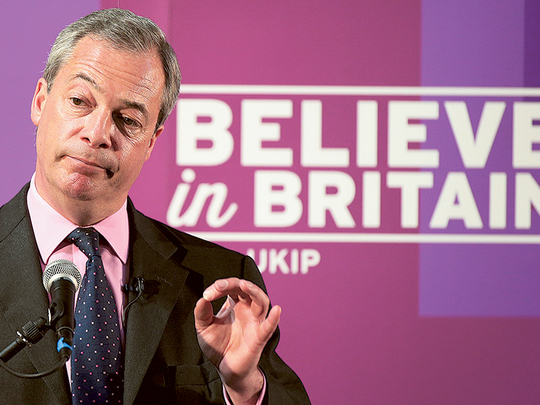
LONDON: A week after a general election in which it won the third biggest share of the national vote but just one seat in parliament, Britain’s UK Independence Party is tearing itself apart in spectacular fashion.
First there was charismatic party leader Nigel Farage’s short-lived resignation, then a big fallout over finances and on Thursday a stunning attack on Farage from the head of his election campaign.
In an interview with The Times, Patrick O’Flynn said Farage was a “snarling, thin-skinned, aggressive” man who was making Ukip look like a “personality cult”.
He called for “a much more consultative and consensual leadership style” and called the recent days a “fiasco” for the party, which is against mass immigration and European Union membership.
“What’s happened since Thursday night, Friday morning has certainly laid us open to the charge that this looks like an absolutist monarchy or personality cult,” said O’Flynn, also Ukip’s economics spokesman.
Businessman Arron Banks, a major party funder, quickly rallied to Farage’s side, telling the BBC that he had “given his all” and “deserved a rest rather than petty squabbling from lesser people”.
Banks said O’Flynn “could take a few lessons from Nigel on presentation and communication” but conceded that Ukip’s internal system “needs to be sorted out”.
The party, which came first in last year’s European Parliament elections, won 12.6-per cent in the general election — nearly four million votes — and won control of Thanet council in southeast England.
Prime Minister David Cameron’s Conservatives won 36.9 and centre-left Labour took 30.4 per cent of the vote.
But the outspoken 51-year-old Farage failed to take the Thanet South constituency in what was his seventh attempt to win a seat in the House of Commons.
He had promised to resign as leader of the party if he did not win a seat and promptly did so on Friday.
The decision was abruptly reversed on Monday, however, when the party rejected the resignation and congratulated Farage on a campaign “success”.
Ukip’s only seat is that of Douglas Carswell, a former Conservative MP who switched over last year and who is seen as a potential future leader of the party.
Carswell clashed with the leadership earlier this week over funding, accusing Ukip officials of seeking to claim more public money than needed for the party.
The MP is entitled to take #650,000 (898,000 euros, $1.0 million) of taxpayers money because of the party’s large popular vote and he was reportedly urged by Ukip officials to hire up to 15 assistants.
Carswell has said it would be “completely inappropriate” to take the money out of principle.
A curt Ukip statement on Wednesday did little to quell rumours of a deep rift within the party.
“Nigel Farage met with Douglas Carswell this afternoon and there’s ongoing discussion about how best to represent four million Ukip voters in a way that is sensible and correct,” it said.
Parties receive #16,700 per seat in Britain’s parliament, as well as an additional #33.33 for every 200 votes nationally, giving the lone Ukip MP a much larger amount of money than his fellow MPs.
Farage joined Ukip in 1993 as a founding member and was first elected to the European Parliament in 1999.
He became Ukip’s leader in 2006 and helped boost the party’s popularity while making it more presentable by rooting out far-right ties and outspoken racists.
The rise of Ukip was a major factor in pushing Cameron to promise to hold a referendum on Britain’s EU membership by the end of 2017.












